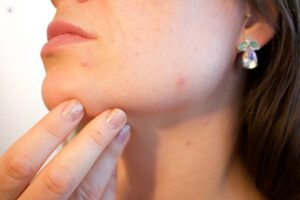Polycystic Ovary Syndrome (PCOS) is a complex hormonal disorder affecting millions of women worldwide. One of the key contributors to PCOS is hyperandrogenism, a condition marked by elevated levels of male hormones like testosterone in the female body. Understanding and effectively managing hyperandrogenism is crucial for alleviating the symptoms of PCOS and restoring hormonal balance. In this guide, we will delve into the hyperandrogenism treatment PCOS and provide valuable insights to empower those navigating the challenges.
Contents
Does PCOS Cause Hyperandrogenism?
 Yes, Polycystic Ovary Syndrome (PCOS) is often associated with hyperandrogenism. This refers to elevated levels of androgens, or male hormones, in the female body. Androgens, such as testosterone, are typically present in both males and females but are usually at lower levels in women. In individuals with PCOS, there is an imbalance in the reproductive hormones, leading to an overproduction of androgens.
Yes, Polycystic Ovary Syndrome (PCOS) is often associated with hyperandrogenism. This refers to elevated levels of androgens, or male hormones, in the female body. Androgens, such as testosterone, are typically present in both males and females but are usually at lower levels in women. In individuals with PCOS, there is an imbalance in the reproductive hormones, leading to an overproduction of androgens.
This hormonal imbalance disrupts normal ovarian function and contributes to the characteristic features of PCOS, including irregular menstrual cycles, anovulation (lack of ovulation), and the development of ovarian cysts. The exact cause of hyperandrogenism in PCOS is not fully understood. However, it is believed to result from a combination of genetic and environmental factors. Insulin resistance, a common feature of PCOS, also plays a role in the development of hyperandrogenism.
What Are Some Best Hyperandrogenism Treatment PCOS?
The hyperandrogenism treatment PCOS often involves a multifaceted approach targeting both the hormonal imbalance and associated symptoms. It’s important to note that individual responses to treatment may vary, and consulting with a healthcare professional is crucial for personalized advice. Here are some common and effective approaches to managing hyperandrogenism in PCOS:
Birth Control Pills
Oral contraceptives are a common and effective treatment for hyperandrogenism in PCOS. Combined hormonal birth control pills, containing both estrogen and progestin, work by regulating the menstrual cycle and suppressing ovulation. By doing so, these medications help reduce androgen production and alleviate symptoms such as irregular periods, acne, and hirsutism. While oral contraceptives address the hormonal imbalance associated with PCOS, they may not be suitable for everyone.
Anti-Androgen Medications
Anti-androgen medications, like spironolactone, are prescribed to specifically target and reduce elevated androgen levels. Spironolactone works by blocking the effects of androgens on the body’s tissues, making it particularly effective in addressing symptoms such as acne and hirsutism. Regular monitoring of blood pressure and potassium levels is crucial while on this medication. It’s important to note that anti-androgen medications are often used in combination with hormonal contraceptives for comprehensive management of hyperandrogenism in PCOS.
Insulin-Sensitizing Medications
Insulin resistance is a common feature of PCOS, contributing to elevated androgen levels. Medications like metformin, originally developed for diabetes management, are often prescribed to improve insulin sensitivity. By addressing insulin resistance, metformin indirectly helps regulate androgen production. This can lead to improvements in menstrual regularity and a reduction in other PCOS symptoms.
Weight Management
Achieving and maintaining a healthy weight is a cornerstone of PCOS management, as excess weight can exacerbate insulin resistance and androgen production. Even a modest weight loss of 5-10% can lead to improvements in menstrual regularity, fertility, and the reduction of androgen-related symptoms. A healthcare provider or a registered dietitian can guide in creating a sustainable and individualized weight management plan.
Nutritional Supplements
Certain nutritional supplements may complement PCOS treatment. Inositol, a B-vitamin derivative, has shown promise in improving insulin sensitivity and ovarian function. Omega-3 fatty acids and vitamin D supplementation may also have beneficial effects on inflammation and hormonal balance. However, it’s crucial to consult with a healthcare provider before initiating any supplement regimen to ensure safety and appropriateness.
Hair Removal Methods
While not addressing the root cause of hyperandrogenism, various methods of hair removal can help manage the cosmetic effects of hirsutism. Laser hair removal and electrolysis are commonly used to reduce unwanted hair growth. These methods provide a longer-lasting solution compared to temporary measures like shaving or waxing. Consulting with a dermatologist or licensed practitioner can help determine the most suitable hair removal method based on individual preferences and needs.
Individuals with hyperandrogenism PCOS need to work closely with their healthcare team to tailor a treatment plan that suits their specific needs. Regular monitoring and adjustments to the treatment plan may be necessary to achieve the best outcomes.
What Are Some Lifestyle Approaches To Help?
 Lifestyle approaches play a crucial role in managing hyperandrogenism PCOS. Here are some effective lifestyle strategies that can help:
Lifestyle approaches play a crucial role in managing hyperandrogenism PCOS. Here are some effective lifestyle strategies that can help:
Regular Exercise
Engaging in regular physical activity is beneficial for individuals with PCOS. Exercise helps improve insulin sensitivity, which can in turn regulate androgen levels. Both aerobic exercises (such as brisk walking, jogging, or cycling) and strength training contribute to overall health and can aid in weight management, a key factor in PCOS management.
Balanced and Nutrient-Rich Diet
Adopting a balanced and nutritious diet is essential for managing PCOS. Focus on whole foods, including fruits, vegetables, lean proteins, and whole grains. Limit processed foods, sugary snacks, and refined carbohydrates, as these can contribute to insulin resistance. Maintaining stable blood sugar levels through a balanced diet is crucial for hormonal balance in individuals with PCOS.
Stress Reduction Techniques
Chronic stress can contribute to hormonal imbalances and exacerbate symptoms of PCOS, including hyperandrogenism. Incorporating stress-reducing techniques such as mindfulness meditation, yoga, deep breathing exercises, or regular relaxation practices can have a positive impact on overall well-being and hormone regulation.
Adequate Sleep
Quality sleep is crucial for hormonal balance and overall health. Lack of sleep or irregular sleep patterns can contribute to insulin resistance and exacerbate PCOS symptoms. Aim for 7-9 hours of quality sleep per night to support hormonal regulation and promote general well-being.
Limiting Caffeine and Alcohol
While moderate caffeine consumption is generally considered safe, excessive intake may contribute to hormonal imbalances. Similarly, excessive alcohol consumption can impact liver function, which plays a role in hormone metabolism. Limiting both caffeine and alcohol intake may be beneficial for individuals with PCOS.
Hydration
Staying adequately hydrated is important for overall health and can support metabolic processes. Water is the best choice for hydration, and it helps flush toxins from the body. Adequate hydration can also support skin health, which may be a concern for individuals with hyperandrogenism.
Regular Health Check-ups
Regular monitoring of health parameters, including blood pressure, cholesterol levels, and blood sugar, is important for individuals with PCOS. Regular check-ups with healthcare providers can help identify and address any emerging health issues promptly.
It’s important to note that lifestyle changes should be approached holistically and sustainably. Consultation with healthcare professionals, including endocrinologists, gynecologists, and registered dietitians, can provide personalized guidance tailored to individual needs and health conditions. Integrating these lifestyle approaches into a comprehensive treatment plan can contribute to better management of hyperandrogenism and overall improvement in PCOS symptoms.
What Vitamin Blocks Androgen?
 Vitamin D is a vitamin that has been associated with potential effects on androgen levels, although it doesn’t directly “block” androgens. Some studies suggest that adequate levels of vitamin D may have a positive impact on hormonal balance, including androgens. However, the relationship between vitamin D and androgens is complex. Hence, more research is needed to fully understand the mechanisms involved.
Vitamin D is a vitamin that has been associated with potential effects on androgen levels, although it doesn’t directly “block” androgens. Some studies suggest that adequate levels of vitamin D may have a positive impact on hormonal balance, including androgens. However, the relationship between vitamin D and androgens is complex. Hence, more research is needed to fully understand the mechanisms involved.
In women with PCOS, which often involves elevated androgen levels, there is ongoing research exploring the potential benefits of vitamin D supplementation. Some studies have indicated that correcting vitamin D deficiency may lead to improvements in insulin sensitivity and hormonal balance. Eventually, this can indirectly influence androgen levels.
It’s important to note that while vitamin D may play a role in overall health and hormonal balance, it should not be considered a direct or standalone treatment for androgen-related conditions. If you are concerned about androgen levels or have a specific health condition related to androgens, it’s crucial to consult with a healthcare professional for personalized advice and appropriate management.
Conclusion
In conclusion, hyperandrogenism treatment PCOS involves a holistic approach combining medical interventions, lifestyle adjustments, and self-care strategies. From birth control pills and anti-androgen medications to lifestyle changes like regular exercise and a balanced diet, individuals can take proactive steps to regulate androgen levels and alleviate symptoms. Emphasizing weight management, stress reduction, and adequate sleep further supports overall well-being.
While there’s no one-size-fits-all solution, a personalized approach guided by healthcare professionals empowers individuals to navigate the complexities of PCOS. Ultimately, fostering hormonal balance and improving the quality of life for those on this journey. If you are facing PCOS-related issues, PCOS treatment at HerMantra can help. Book your free trial online pcos treatment session now.


